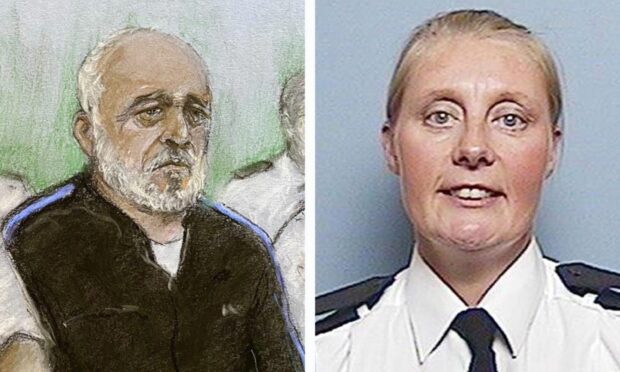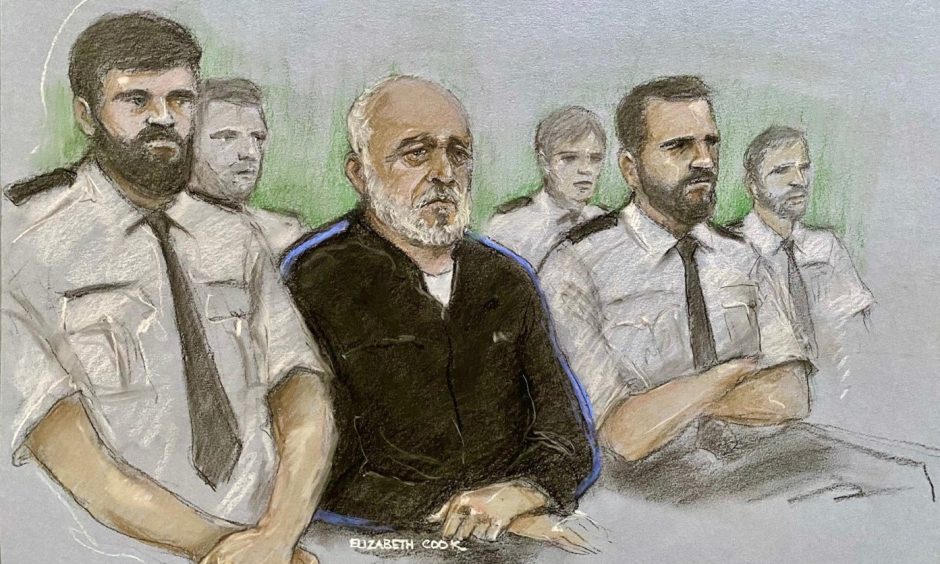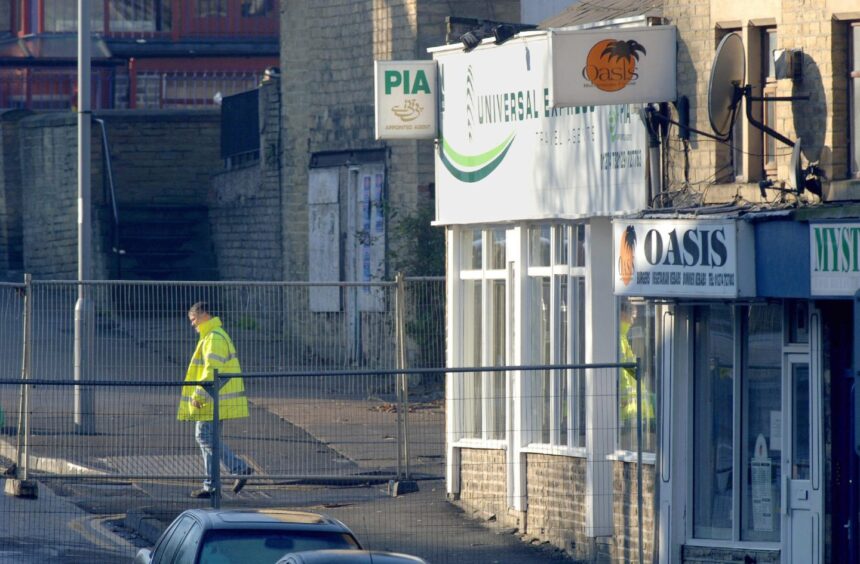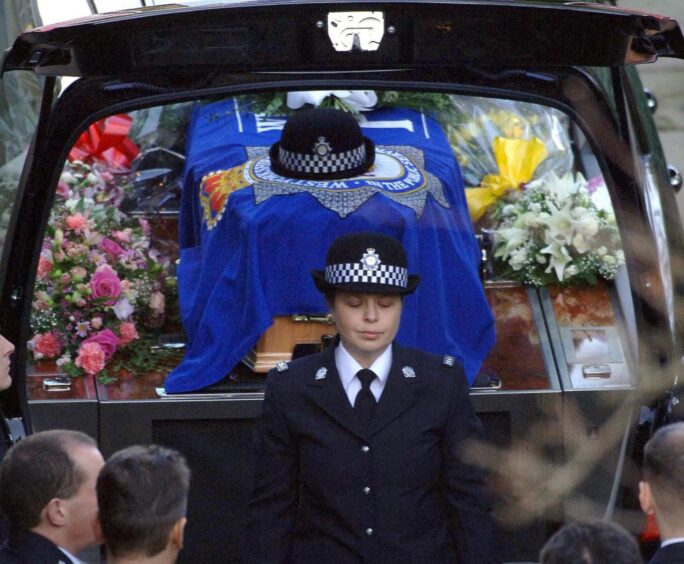A former Aberdeen restaurant boss has gone on trial accused of murdering a police officer in England.
Piran Ditta Khan was described as the mastermind of a Bradford armed robbery which saw police constable Sharon Beshenivsky shot dead.
As his murder trial began at Leeds Crown Court, prosecutors told a jury he evaded capture for almost 20 years before being extradited from Pakistan.
Pc Beshenivsky was killed on November 18 2005 as she and her colleague Pc Teresa Milburn responded to a report of a robbery at Universal Express travel agents in Morley Street, Bradford.
The 75-year-old, who lived in Aberdeen from the early 1980s until 1998, worked in the Shish Mahal restaurant on Union Street and owned another takeaway.
He also launched Crown Palace on Justice Mill Lane, which closed in April 1998 after a fire.
An associate of Khan told The Press and Journal at the time that he had left the north-east shortly after the incident.
Prosecutor Robert Smith KC said the two officers were shot at almost point blank range by one of three men who had just committed the robbery, with the gunman “firing indiscriminately” as he ran away from the scene before getting into a nearby car.
Jurors heard that in total, seven men were involved in committing the robbery, all of whom have since been convicted with the exception of Piran Ditta Khan.
Khan, 75, who prosecutors say planned the robbery, flew to Pakistan three months after Pc Beshenivsky’s death and remained at liberty there until he was arrested and detained by Pakistani authorities in January 2020.
Mr Smith said he arrived in the UK last April after an extradition request from the British Government, and is now on trial charged with murder, two counts of possession of a firearm with intent to endanger life and two counts of possession of a prohibited weapon.
Pc Beshenivsky’s widower Paul watched from the public gallery as the trial got underway on Tuesday.
Mr Smith told jurors that although Khan was not one of the three men who carried out the robbery, and did not shoot Pc Beshenivsky, he “was responsible for organising this robbery in the knowledge that loaded firearms were to be carried”.
Jurors heard that during the robbery, Khan “did not leave the safety” of a Mercedes SLK which was being used as a lookout car.
But, Mr Smith said, the men who carried out the robbery “were disposed to use their firearms to kill or to seriously injure anyone who stood in their way … something of which the defendant would have been well aware”.
“The part he played was such that the prosecution contend he is also guilty of the murder of Sharon Beshenivsky,” the prosecutor said.
Leeds Crown Court heard that as well as being a travel agents, Universal Express provided a service for people living and working in the UK to transfer money to the bank accounts of relatives in Pakistan.
Mr Smith said Khan, who lived in Ilford, north London, had used this service before and was “the only one amongst the group that knew the location of the business and the interior of the premises in question”.
The court also heard he would have been aware that large amounts of cash were kept on the premises during the day.
Jurors heard that the seven men had assembled at a house in Leeds on the morning of the robbery, and a witness overheard one of them asking Khan how much money they could expect to get.
The witness heard Khan saying a minimum of £50,000 and a maximum of £100,000, Mr Smith said.
Jurors were told that staff at Universal Express had to let customers into the premises through a door with an electric lock.
Armed robbers at Universal Express had pistol and machine gun
Mr Smith said two of the men who carried out the robbery were “dressed for the occasion in suits”, while the third was dressed in a smart white shirt and jacket.
One of them also carried a laptop bag which contained “at least one pistol and machine gun, both of which were loaded”, as well as a large knife and cable which was intended for “tying up staff at the premises”.
“Their conduct in dressing this way was not by chance but as a result of knowledge of how the premises were operated, in particular the need to present themselves as responsible persons in order to be admitted to the premises,” the prosecutor said.
Mr Smith said Khan was the only one of the group who had this knowledge, and told jurors the defendant had also visited Universal Express five days earlier “in order to complete planning for the robbery”.
The court heard that on the day of Pc Beshenivsky’s death, the three cars involved in the robbery – a Toyota Rav4 containing the three men who carried out the robbery, the Mercedes SLK in which Khan was a passenger and a Toyota Corolla – travelled in convoy and parked at different locations close to the business.
Jurors were told Pc Beshenivsky, 38, and Pc Milburn, who was 37 at the time, were both unarmed when they attended a report of a robbery and “neither presented any effective threat to the three men”.
Mr Smith said Pc Beshenivsky was slightly ahead of Pc Milburn as they approached the door of Universal Express.
Pc Milburn later described seeing the door open and an Asian man stretching out his hand in front of him and pointing at Pc Beshenivsky.
Mr Smith said: “After this man shot Sharon Beshenivsky, Teresa Milburn saw him move his pistol towards her. She heard a bang and felt immense pain. She knew immediately she had been shot.”
The court heard Pc Beshenivsky’s injury was immediately fatal. Pc Milburn, who activated her personal radio and called for help as she was coughing up blood on the pavement, survived her injuries after hospital treatment.
Mr Smith said before he left the UK for Islamabad, Khan had a “settled business and domestic life in England and Scotland,” and owned a fast food outlet in Aberdeen.
The court heard the other men involved in the robbery have since been convicted of offences including murder, manslaughter, robbery and possession of a firearm with intent to endanger life.
Khan denies the charges and the trial continues.



